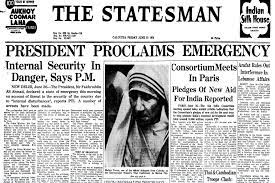The Emergency in India refers to a period from 1975 to 1977 when a state of emergency was declared by then-Prime Minister Indira Gandhi. It was a time of authoritarian rule characterized by the suspension of civil liberties, censorship, and widespread human rights violations.
The events leading up to the declaration of Emergency can be traced back to political and legal disputes surrounding Indira Gandhi’s tenure as Prime Minister. In 1975, she was found guilty of electoral malpractices by the Allahabad High Court. The court ruled that her election to the Lok Sabha (the lower house of the Indian Parliament) in 1971 was invalid, which could have resulted in her removal from office.
Faced with the possibility of losing power, Indira Gandhi responded by declaring a state of emergency on June 25, 1975. She cited “internal disturbances” as the reason for imposing emergency rule, although many critics argued that it was a move to consolidate her power and suppress political opposition.
During the Emergency, several fundamental rights enshrined in the Indian Constitution were suspended. Civil liberties were curtailed, and the government had sweeping powers to detain individuals without trial, censor the media, and suppress dissent. Indira Gandhi’s government unleashed a wave of repression against political opponents, journalists, and activists. Many opposition leaders were arrested, political parties were banned, and press censorship was enforced.
The period also witnessed the forced sterilization campaign, known as the “family planning program.” The government implemented a controversial policy to control the population growth, which led to the coerced sterilization of millions of people, primarily targeting the poor and marginalized sections of society.
The Emergency was met with widespread public protests and resistance. Political activists, student organizations, and civil society groups rallied against the authoritarian regime. The opposition parties formed an alliance called the Janata Party, which united various anti-Emergency factions and fought against Indira Gandhi’s party, the Indian National Congress, in the 1977 general elections.
In 1977, following a 21-month period of Emergency rule, Indira Gandhi called for fresh elections and lifted the Emergency. The Janata Party, led by Morarji Desai, won a decisive victory, and Indira Gandhi was voted out of power. This marked the end of the Emergency and a return to democratic governance in India.
The Emergency period remains a contentious and significant chapter in Indian history. It highlighted the importance of protecting civil liberties, upholding democratic values, and the need for checks and balances on the power of the executive branch. The memories of the Emergency continue to shape political discourse and discussions on the balance between national security and individual freedoms in India.







